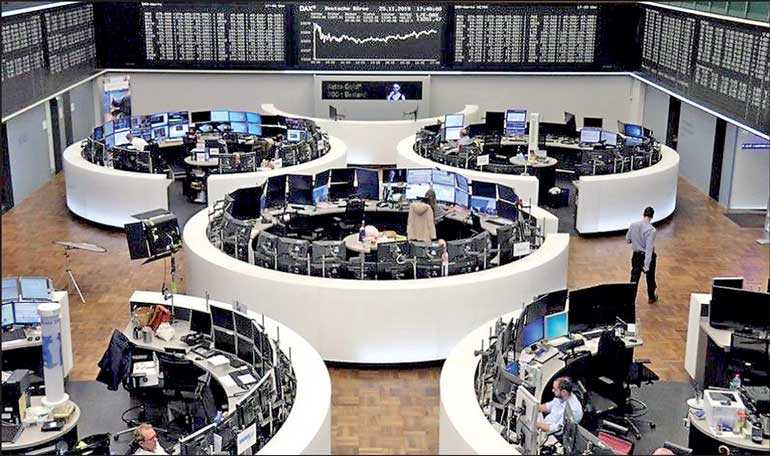Saturday Feb 28, 2026
Saturday Feb 28, 2026
Friday, 29 November 2019 00:00 - - {{hitsCtrl.values.hits}}

London (Reuters): A four-day rally that had lifted world stocks to near-record highs stalled on Thursday after China said it would retaliate for US legislation backing Hong Kong’s protesters, leaving investors concerned as to the extent of the Chinese response.
Fading hopes of a rapprochement between the world’s two biggest economies before additional, potentially damaging tariff hikes kick in has lowered risk appetite, pushing the benchmark German 10-year government yield to its lowest since 1 November DE10YT=RR.
The yen - a safe-haven currency - gained against the US dollar, recovering from six-month lows JPY=EBS. London’s blue-chip index fell from two-month highs .FTSE and a pan-European stocks index was down 0.2%, led by trade-sensitive sectors such as autos, down 0.6% .SXAP and tech, down 0.4%. .SX8P.
The US legislation, which threatens sanctions for human rights violations and seeks to safeguard Hong Kong’s autonomy, prompted China to warn of “firm counter measures”.
China’s state council said that it would step up punishment for intellectual property violations - a key sticking point in the US-China conflict - and that it would lower non-tariff trade barriers. Fears as to the extent of Chinese retaliation started to ease during London trading.
“When you see the optics of siding with Hong Kong against the mainland, that would seem at face value to be intuitively antagonist to the prospect of the trade negotiations,” said Jeremy Stretch, head of G10 FX strategy at CIBC capital markets.
However, he said, “It may prove to be the case that despite the threat of a Chinese reprisal they may not be quite as significant or dynamic as feared.
“It is an external headwind but, for now at least, the markets are starting to take a slightly more sanguine viewpoint of the outcome,” Stretch said.
Wall Street’s main indexes closed at record levels for a third straight day on Wednesday, albeit in thin liquidity before the Thanksgiving holiday, after data showed US economic growth had picked up in the third quarter and consumer spending had increased. Elsewhere, though, the outlook for growth looks less rosy. Japanese retail figures slumped the most since 2015 as a sales tax hike dragged on the economy, exacerbating a slowdown caused by slowing exports and manufacturing. That took Asian shares excluding Japan down 0.2% .MIAPJ0000PUS. Japan’s Nikkei .N225, Hong Kong’s Hang Seng .HSI and Shanghai blue chips .CSI200 all closed weaker.
That kept MSCI’s world equity index flat, after it approached the record reached in January 2018. However, the index is up almost 3% so far in November and is on track for the best month since June as investors flit in and our depending on the trade news .MIWD00000PUS.
“People don’t want to be caught on the wrong side,” said Geoff Yu, head of the UK investment office at UBS Wealth Management. “It does reflect there’s cash on the sidelines. If you can stretch the positive narrative, if the trade issue is out of the way for the time being, we might actually see a demand pick up.”
US markets are closed for Thanksgiving, but equity futures for all three major indexes were down between 0.2% and 0.3% ESc1 YMc1 NQc1.
Euro zone economic sentiment rebounded more than expected in November, with more optimism in the services sector, data from the European Commission showed.
Sentiment in industry, among consumers, and in industry all improved but remain below zero. The euro was little changed by the news.
Data released on Thursday also showed that bank lending to euro zone companies in October rebounded, after dropping the month before.
The British pound GBP=D3 rose on Wednesday after a model for pollsters YouGov, which accurately predicted the 2017 election, said Prime Minister Boris Johnson was on course to win a majority in parliament at the 12 December election.
However, the currency failed to build on its gains, trading steady against the dollar at $1.2926. It was little changed versus the euro after surging to its highest in nearly seven months at 85 pence in early London trading EURGBP=D3.
Implementing Brexit by the end of January, as Johnson had promised, would leave him a “miniscule” 11 months to agree a trade deal with the European Union, analysts at Societe Generale told clients.
The Institute for Fiscal Studies - a British think tank - said that neither of the UK’s major parties have credible plans to manage Britain’s public finances.